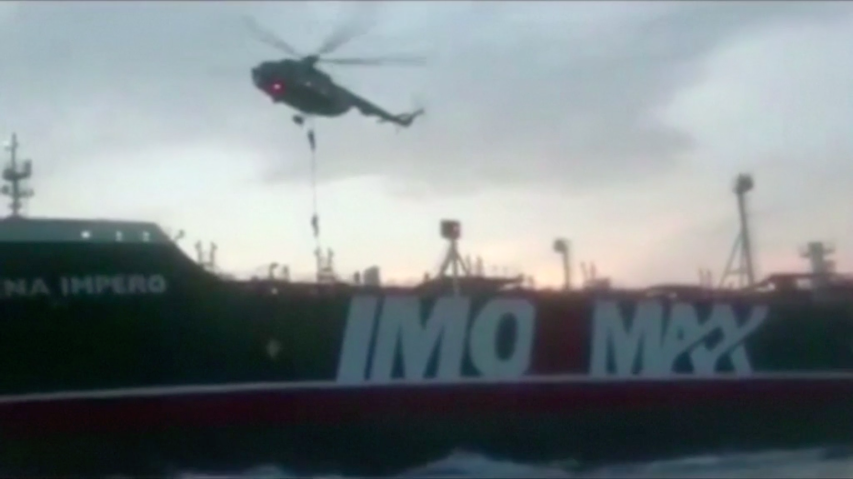
Last month the Persian Gulf was the scene of many provocative and hostile actions by Iran against vessels operating in international waters. The acts of sabotage near the UAE coast highlight new threat to maritime traffic and global oil supplies.
On June 20, 2019, Iran shot down a United States military drone; the US claims the drone was shot down in international airspace.
July 10, 2019, Armed Iranian boats try unsuccessfully to impede the passage of a British oil tanker in the Persian Gulf, according to two US officials with direct knowledge of the incident.
July 14, 2019, Over the weekend, Iran seizes an oil tanker that it claimed was carrying 1 a million liters of “smuggled fuel,” according to state news agency Press TV.
July 18, 2019, US officials declared the US Navy destroyed an Iranian drone in a defensive action after it came too close to the naval ship USS Boxer.
July 19, 2019, Iran’s IRGCs announces that its navy has captured the British-flagged oil tanker, Stena Impero.
Seizure of UK-flagged tankers could make it hard for Trump and Britain to hesitate to act. The British government has warned that Iran is choosing “a dangerous path of illegal and destabilizing behavior” and advised UK ships to avoid the strait of Hormuz.
On Friday Foreign Secretary Jeremy Hunt told Sky News: “We are absolutely clear that, if this situation is not resolved quickly, there will be serious consequences.”
“We remain deeply concerned about Iran’s unacceptable actions, which represent a clear challenge to international freedom of navigation,” a government statement said, following a meeting of ministers to discuss the incident in the Strait of Hormuz.
Donald Trump later told reporters that Iran’s seizure of tankers in the Strait of Hormuz just reconfirmed what he had long believed about the Iranian regime. “This only goes to show what I’m saying about Iran: trouble, nothing but trouble,”
The tensions have become particularly serious in the last week after the USS Boxer destroyed an Iranian drone that the Pentagon said had ignored warnings and come close to the US warship.
The continued provocations have reignited concerns that Iran deliberately take actions to increase tensions.
Iran‘s regime is taking careful measures, not to go too far (yet). One aim is to raise oil prices in order to force the West into backing off. However, Tehran knows Trump is no Obama. Thus, they’re desperate to buy time & save face.
James Stavridis, a retired US admiral and former supreme commander of Nato, said Washington and Tehran were “on a collision course” as Iran reacted to the “ruinous sanctions” from the US. “They seem to believe that the best way to break out is bad behavior — striking and seizing tankers, offensive cyber-attacks and shooting down US drones,” said Mr Stavridis. “The US eventually will strike at Iranian naval assets as we did in the 1980s tanker wars unless Iran stops its activities. Buckle up.” Many experts believe that the real red line for military action by Washington is any Iranian act that killed an American, a possibility enhanced by the presence of thousands of US troops in Iraq, where Iranian proxies operate with little restraint. Mike Singh, a former Bush administration official, said deterring Iranian attacks would be difficult because the regime appeared to have concluded that Mr. Trump was wary of taking military action.
But the Trump administration believes the sanctions will eventually force Tehran to come to the negotiating table. “Iran is in big trouble right now,” Mr. Trump said. “Their economy is crashing. It’s coming to a crash.” One senior US official said Iran had miscalculated in thinking that Europe would be able to convince Mr. Trump to adopt a more lenient approach.
Opposition leader Mrs. Maryam Rajavi said in a tweet: “The mullahs’ unbridled actions in the Persian Gulf for blackmail need a firm response by the international community. They should not be allowed to be emboldened. Force & firmness is the language they understand well. They must not be given the chance for further blackmail.”
On July 11, 2019, a major 5-day international conference was held in Ashraf-3, home to thousands of MEK members in Albania. Prominent speakers discussed policy options for the US, Europe and their allies in dealing with the Iranian crisis. Ambassador Robert Joseph, former U.S. Under Secretary of State for Arms Control said: “The right policy is whatever accelerates the end of this regime. The wrong policy is what prolongs the life of this regime. Appeasement has turned out to be not just a failure but also counter to American interests. We should start with maximum pressure, and the administration has been doing a good job. The sanctions are having a deep impact on the Iranian economy.
“If we show weakness, it’s provocative. When we show strength, the regime backs down. It’s important that we always keep in mind that the show of strength is key to success.”
- Something Changed This Week For The Iranian Resistance
- Why Iran’s Nuclear Posturing Is A Bluff Albeit A Dangerous One


1 comment
“Mike Singh, a former Bush administration official, said deterring Iranian attacks would be difficult because the regime appeared to have concluded that Mr. Trump was wary of taking military action.”
A Bushite speaks with forked tongue. Trump doesn’t need advice from anti-Trumpers